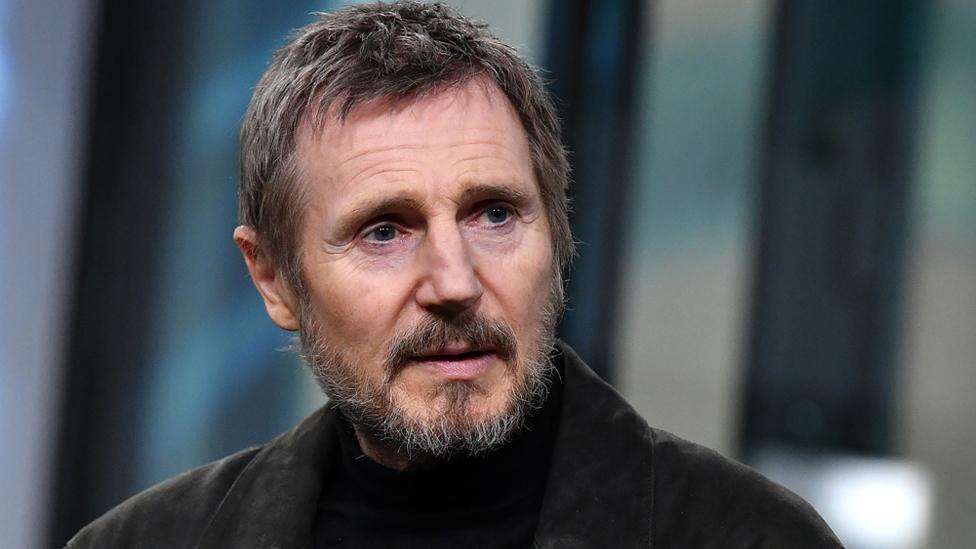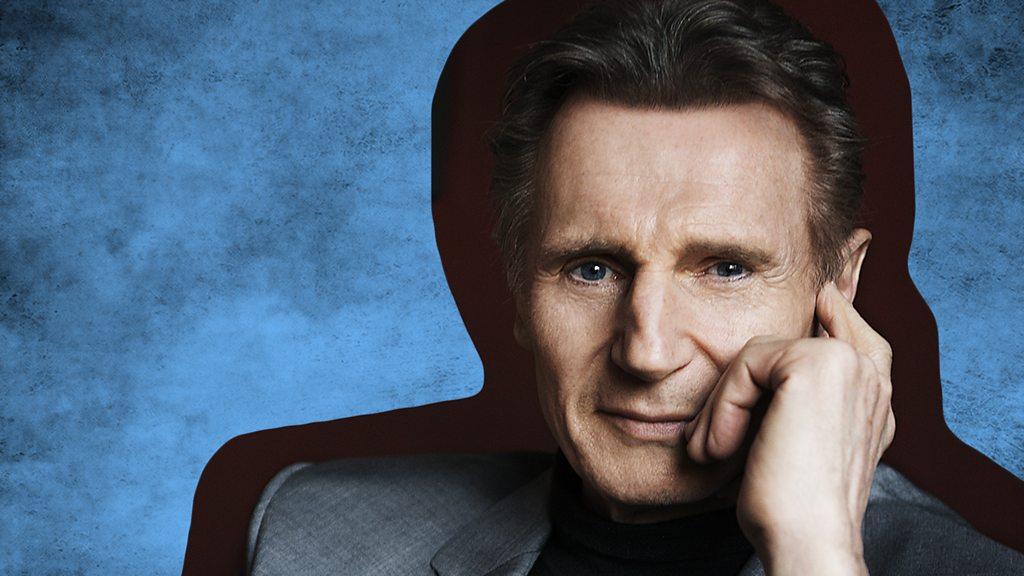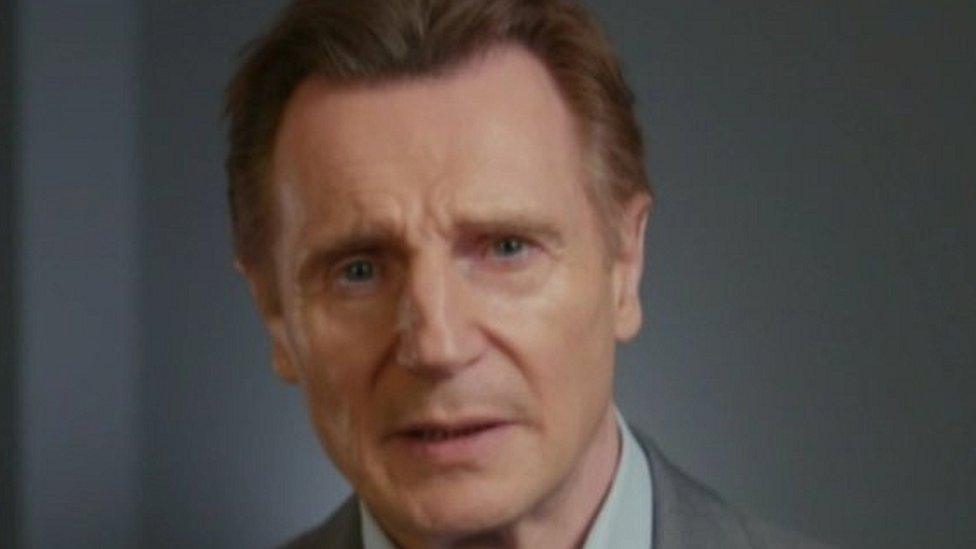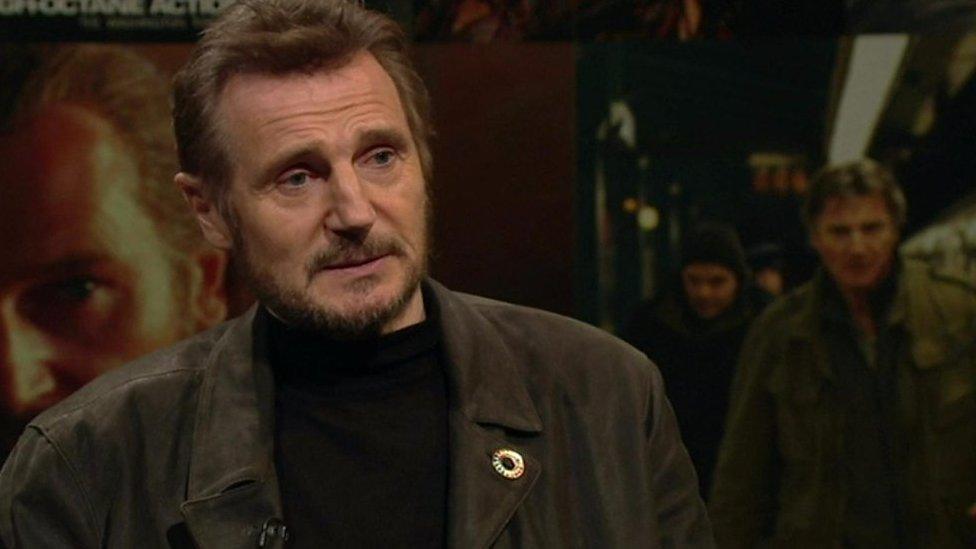Liam Neeson in racism storm after admitting he wanted to kill a black man
- Published

Actor Liam Neeson is facing a major racism storm after admitting he once set out to kill an innocent black man.
He said he walked the streets with a weapon for a week years ago, hoping to take out his anger after someone close to him was raped by a black man.
The Hollywood star said he was ashamed of his actions, but his remarks have sparked widespread outrage.
Neeson hasn't commented further since the interview was published by The Independent, external on Monday.
He was speaking to promote his new film Cold Pursuit, a thriller about a man who seeks retribution after his son is murdered.
Asked how his character turns to anger, the actor replied that "something primal" kicks in when a someone close to you is the victim of violence.
Listen to Liam Neeson's comments that sparked the outrage
He said: "God forbid you've ever had a member of your family hurt under criminal conditions. I'll tell you a story. This is true."
Neeson said the alleged rape took place a long time ago and he found out about it when he came back from a trip abroad. The actor went on to use racially offensive language about the attacker.
He said: "She handled the situation of the rape in the most extraordinary way.
"But my immediate reaction was... I asked, did she know who it was? No. What colour were they? She said it was a black person.
"I went up and down areas with a cosh, hoping I'd be approached by somebody - I'm ashamed to say that - and I did it for maybe a week, hoping some [uses air quotes with fingers] 'black bastard' would come out of a pub and have a go at me about something, you know? So that I could kill him."
Neeson has been subject to huge criticism for the comments.
Clemence Michallon, who interviewed Liam Neeson, says she was struck by the "gravity" of his thoughts
The journalist who did the interview, Clémence Michallon, told BBC News: "Anyone hearing the thoughts that he's reporting here would be shocked and appalled in many ways, and he himself says he is ashamed to think of the way he used to think and says it's awful, so of course that shock set in really quickly."
In an accompanying article in The Independent, external, columnist Kuba Shand-Baptiste wrote: "What immediately struck me when reading about his revelation was how deeply the white supremacist trope of the 'black brute' versus the 'helpless woman' appears to have permeated society."

Neeson alongside Tom Bateman in Cold Pursuit
Los Angeles Times columnist Carla Hall wrote , externalthat his conduct was "despicable", adding that she now wants him to talk about whether he has dealt with "whatever racism he still harbours".
She wrote: "Was he a racist or just a tightly wound man capable of vindictive violence? Or was he both? Of course, he was a racist. He was roaming the streets trying to find a random black man to kill.
"And he gave every indication of being capable of violence. That's a pretty explosive combination. And his revelation about himself is deeply disturbing. The question is, how much has he changed since then?"
On Twitter, Frederick Joseph, who works for better representation in the media, wrote that Neeson's story "just shows how meaningless and inconsequential black lives are to some".
Allow X content?
This article contains content provided by X. We ask for your permission before anything is loaded, as they may be using cookies and other technologies. You may want to read X’s cookie policy, external and privacy policy, external before accepting. To view this content choose ‘accept and continue’.
Allow X content?
This article contains content provided by X. We ask for your permission before anything is loaded, as they may be using cookies and other technologies. You may want to read X’s cookie policy, external and privacy policy, external before accepting. To view this content choose ‘accept and continue’.
Allow X content?
This article contains content provided by X. We ask for your permission before anything is loaded, as they may be using cookies and other technologies. You may want to read X’s cookie policy, external and privacy policy, external before accepting. To view this content choose ‘accept and continue’.
Allow X content?
This article contains content provided by X. We ask for your permission before anything is loaded, as they may be using cookies and other technologies. You may want to read X’s cookie policy, external and privacy policy, external before accepting. To view this content choose ‘accept and continue’.
Neeson referred back to his comments later in the interview, adding: "It was horrible, horrible, when I think back, that I did that. And I've never admitted that, and I'm saying it to a journalist. God forbid.
"It's awful. But I did learn a lesson from it."
Some said Neeson should not be castigated for admitting such thoughts but realising they were wrong and saying he had learned from them.
Allow X content?
This article contains content provided by X. We ask for your permission before anything is loaded, as they may be using cookies and other technologies. You may want to read X’s cookie policy, external and privacy policy, external before accepting. To view this content choose ‘accept and continue’.
However, others pointed out that he didn't specifically acknowledge any underlying racial motivations.
Allow X content?
This article contains content provided by X. We ask for your permission before anything is loaded, as they may be using cookies and other technologies. You may want to read X’s cookie policy, external and privacy policy, external before accepting. To view this content choose ‘accept and continue’.
The 66-year-old, who is best known for Schindler's List and the thriller series Taken, also described growing up around violence in County Antrim, Northern Ireland, during the Troubles.
"I knew a couple of guys that died on hunger strike, and I had acquaintances who were very caught up in the Troubles, and I understand that need for revenge, but it just leads to more revenge, to more killing and more killing, and Northern Ireland's proof of that.
"All this stuff that's happening in the world, the violence, is proof of that, you know. But that primal need, I understand."
Former footballer John Barnes says Liam Neeson ‘deserves a medal’.

Follow us on Facebook, external, on Twitter @BBCNewsEnts, external, or on Instagram at bbcnewsents, external. If you have a story suggestion email entertainment.news@bbc.co.uk, external.
- Published15 June 2017

- Published8 February 2017

- Published13 January 2018
